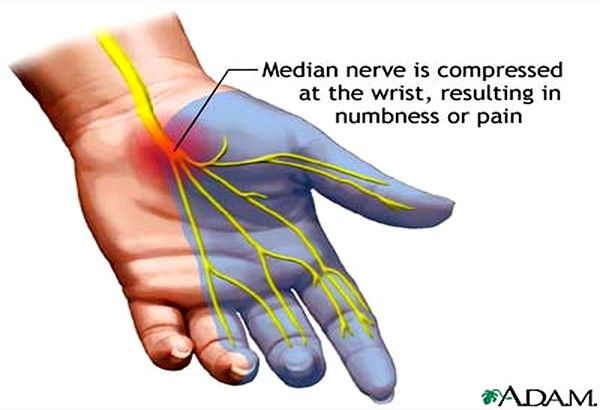Numb hands and fingers: It’s carpal tunnel syndrome


Does your hand feel numb? Does it only involve the hand area (palm and fingers) and not the arms? If so, then it’s probably carpal tunnel syndrome.
Carpal tunnel syndrome (CTS) is a condition believed to be caused by too much work using the hands, such as for writers, computer workers, waiters, carpenters, construction workers, and handicraft makers. Aside from hand numbness, there could be weakness of the hands in the later stages.
What causes the numbness? In carpal tunnel syndrome, a nerve called median nerve is usually the one affected. Anatomically, the carpal tunnel is a narrow passageway at the palm side of your hand (near the wrist). Through this opening passes the median nerve and several tendons used to bend the fingers. In carpal tunnel syndrome, there could be some swelling and narrowing of this opening, thus compressing the median nerve.
Several risk factors have been associated with carpal tunnel syndrome. Diabetes and heavy alcohol drinking can damage the nerves. Inflammation caused by rheumatoid arthritis and infections can also affect the wrist tendons passing through the carpal tunnel passageway. Conditions, such as pregnancy, obesity, kidney failure and thyroid diseases, can give rise to excess body fluids, and thus contribute to hand swelling,
Statistics show that women are more commonly affected than men. Individuals whose parents have carpal tunnel syndrome are more prone to get it, too. In addition, repeated hand use, hand flexion or use of vibrating machinery may contribute to this disease.
For mild cases of carpal tunnel syndrome, several preventive measures can be taken:
1. Rest your hands. Minimize typing, texting, and knitting. Doing the laundry, ironing, and playing musical instruments may likewise predispose one to carpal tunnel syndrome.
2. Take regular breaks. You may use your less affected hand more.
3. Don’t forcibly use your hands. Try to relax your normal grip. Take it easy with the laundry work and household cleaning. If you have to carry heavy objects, don’t overwork your wrist. Use more of your arms and shoulders to carry things.
4. Use a big fountain pen or an oversized ballpoint pen. Make sure your pen writes smoothly and freely so you don’t need to exert too much force.
5. Keep your back straight. When you improve your posture, your shoulders, arms, and hands will naturally become straighter and more relaxed. This may reduce nerve compression.
6. When sleeping, prop your hand over a pillow. This will help keep your wrist straight and at a level equal to or higher than the heart area. This elevated position could help lessen swelling in the hands. The worst scenario would be to accidently sleep with your hand dangling outside the bed.
7. Avoid bending your wrist. If you accidently sleep with your hands bent, this could squeeze on the nerve and make your hands numb in the morning. Some people are fond of sleeping with their head resting on their hand. This is again another no-no. Keep your wrist straight often to avoid compressing the nerve.
8. Do special hand exercises. Some experts recommend an exercise routine, which involves raising both hands in the air. And then turning the wrist in a small circular fashion. It’s like you are conducting an orchestra. Do this circular motion gently and from time to time. This routine may help loosen the tightness that impinges on the wrist nerve.
9. Raise your hands often. It may help if you rest your hands on an armchair or on your chest. Doctors may recommend a splint to keep your wrist straight. Again, the purpose is to keep your hand straight, especially at night.
10. Don’t tightly wrap your hands with a bandage or wristband. Tight bands can reduce the blood flow to your hands.
11. Keep your hands warm. Cold environments can make your hands and wrist stiffen up. Use a normal glove or a fingerless glove to protect your hand.
12. Reduce your salt intake. Too much salt in your diet can lead to water retention. This could potentially worsen the swelling of the hand area.
13. Reduce weight if overweight. People who are obese also have larger (fatter) hands, which can possibly worsen the condition.
14. Try vitamin B complex tablets. It’s not a cure, but taking vitamin B6 may help the nerves.
15. Consider a pain medicine. Taken only for a short time, pain relievers may alleviate the pain of carpal tunnel syndrome. However, there is no evidence that these medicines will cure it.
16. Check your blood sugar and take other tests. Medical conditions such as diabetes and arthritis can also cause hand numbness. Your doctor may order some tests to rule out these ailments.
For more severe cases of carpal tunnel syndrome, your doctors may inject a steroid solution in the carpal tunnel area. If symptoms still persist, a surgical procedure to loosen the passage of the median nerve is another option.
If you experience hand numbness or weakness, go and visit your hand surgeon, rheumatologist or orthopedic surgeon. They can help you, especially if you consult early. Good luck!



















